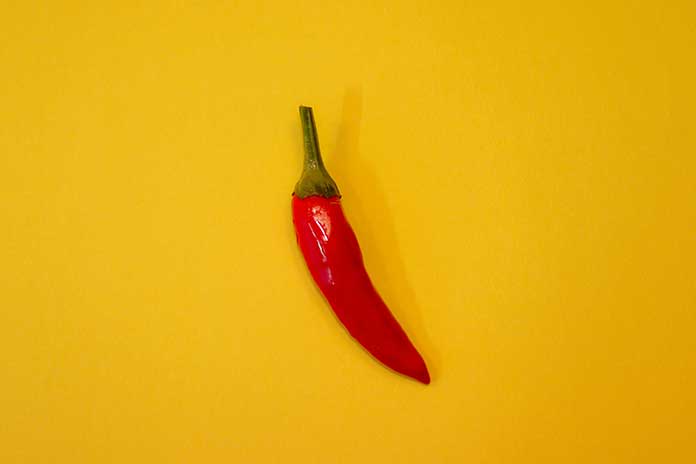Eating Chili Pepper Extends Life
Of very ancient origins, introduced into Europe by Christopher Columbus, the chili pepper is one of those aromatic plants that should never be missing from our balconies and in our daily cuisine. Initially becoming famous for its “superstitious properties”, especially in the regions of southern India, it is now also recognized for its numerous beneficial properties.
- In fact, those who regularly consume chili pepper are more likely to live longer and have a lower risk of mortality from cardiovascular problems. This is what emerged from one conducted.
- The study participants were divided into four groups based on their consumption of chili pepper: non-consumers or occasional consumers, consumers twice a week, those between 2 and 4 times a week and those who consume chili pepper even more than four times. Times a week.
- It has thus been observed that they live longer and have a 40% lower risk of death for heart problems (such as myocardial infarction ) and a 60% lower risk for cerebrovascular issues (such as stroke).
- Furthermore, regular consumption of chili peppers is associated with a reduced risk of arterial hypertension (high blood pressure values), especially in women.
Nutritional Properties Of The Chili Pepper
Although the studies do not report precisely the cause-effect mechanisms that describe an association between chili pepper and beneficial effects, in particular for heart health, the most accredited hypothesis is that this favorable combination is due to capsaicin, that is, that substance contained in the chili pepper which gives it that typical spicy flavor.
Capsaicin appears to act:
- Blood coagulation helps to prevent the formation of clots and thrombi, one of the leading causes of heart attack and stroke.
- On blood sugar, promoting greater control of blood sugar, as high blood sugar levels are a risk factor for heart problems.
- On LDL cholesterol levels (the “bad” one), it is reducing its levels. Remember that high levels of cholesterol in the blood favor the formation of clots in the blood vessels, leading to a higher risk of heart attack and stroke.
In addition to capsaicin, chili pepper contains numerous vitamins and minerals, such as:
- Vitamin A is very important for eye health and its antioxidant properties.
- Vitamin C is helpful in strengthening the immune system, preventing some forms of cancer and fighting free radicals.
- Potassium is a mineral that participates in the contraction of muscles (including the heart), regulating the balance of fluids and minerals and helps maintain normal blood pressure, mitigating the harmful effects of sodium.
These nutrients have an anti-inflammatory function, as they help reduce the risk of developing cardiovascular problems.
Effects Of Capsaicin On Weight And Pressure
Capsaicin seems to act mainly through a receptor channel ( TRPV1 (Transient Receptor Potential Vanilloid 1), present on the surface of the cells of our nervous system, which activates a series of cascade effects, starting with the production of heat (thermogenesis). This is why, when we eat spicy food, we feel hot.
- According to some studies, burning fat and consuming energy (calories), which could lead to a
- Although in smaller quantities, TRPV1 would also appear to be present in the outermost cells of the heart muscle, a substance, therefore, blood pressure.
For some years, many clinical studies have shown that certain foods can help with high blood pressure. A survey carried out by the Hypertension Operational Unit of the Guglielmo da Saliceto Hospital in Piacenza, led by Dr Giuseppe Crippa, demonstrated that in 30 moderately hypertensive patients, the daily consumption of 30 grams of Grana Padano PDO aged for 12 months, for 60 days, blood pressure not only did not increase but, at the same time, there was a tendency towards its reduction.
The effect is attributable to the enzymes ( tripeptides ) that are naturally formed during the processing and maturing of Grana Padano DOP cheese. These enzymes have ACE inhibitor properties, just like the most common drugs prescribed for those suffering from hypertension.
Contraindications
As with any other food, excessive consumption of chili pepper can cause various health problems, for example, gastrointestinal disorders: poor digestion, heartburn or gastritis, diarrhea, ulcers in more severe cases, etc. Furthermore, it is not recommended to eat spicy food if you have hemorrhoids or anal fissures. Particular attention should be paid to the consumption of chili pepper if you are taking anticoagulant and antiplatelet drugs, as there may be side effects.
- Currently, it has yet to be possible to establish with certainty the correct quantities of chili pepper to consume daily to obtain substantial benefits. According to some studies, you should consume at most 10 mg of chili pepper per day.
- Tolerance must be tested on an individual basis, but the advice, valid for everyone, is one: eating a little chili every day is fine; the important thing is not to overdo it!
Also Read: The Best Foods For The Heart


